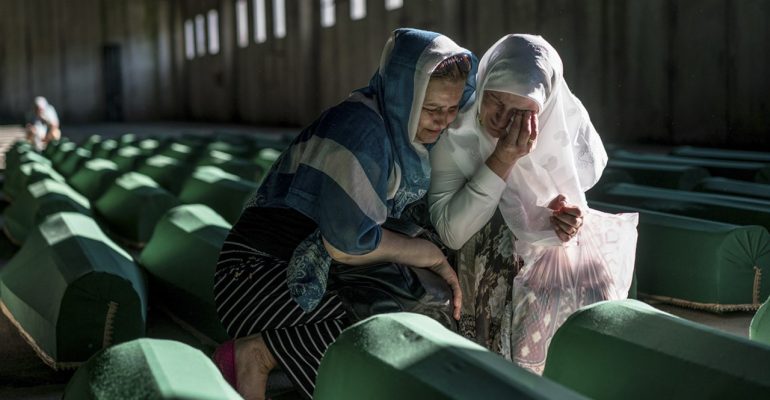Netherlands partly liable for 1995 massacre of Bosnian Muslim men, court rules
July 6, 2017 2023-07-23 12:03Netherlands partly liable for 1995 massacre of Bosnian Muslim men, court rules

Netherlands partly liable for 1995 massacre of Bosnian Muslim men, court rules
A Dutch court ruled on Tuesday that the government was partly liable for the deaths of about 350 Muslim men in 1995 in the Bosnian town of Srebrenica, the site of Europe’s worst mass murder since World War II.
The court largely upheld a landmark 2014 judgment that found the Netherlands liable in the deaths of the men, who were turned over to Bosnian Serb forces by Dutch peacekeepers operating under the command of the United Nations, and then killed.
But unlike that judgment, the new ruling limits the Dutch government’s liability to 30 percent of the damages, based on its assessment that the victims would have had a 70 percent chance of being killed even if Dutch peacekeepers had not wrongfully ordered them, on July 13, 1995, to leave a United Nations compound after the area was overrun by Bosnian Serb paramilitary forces.
In all, the massacre claimed the lives of at least 8,000 Bosnian Muslim men and boys. They were systematically separated from women and girls, hauled away, bound, shot and buried in mass graves. Among the few survivors were some who pretended to be dead. International courts have declared the killings a genocide.
The Dutch court affirmed that Bosnian Serb paramilitary units bore the main responsibility for the massacre, but agreed with the plaintiffs that the Dutch peacekeeping battalion operating under the aegis of the United Nations, known as Dutchbat, could and should have done more to protect the 350 men.
“All arguments weighed against each other, the court puts the chance that the men would have escaped inhumane treatment and execution by the Bosnian Serbs if they could have stayed at the United Nations compound at 30 percent,” the ruling, by the Dutch Court of Appeal in The Hague, stated. By not giving the men the choice to stay, “the Dutch state deprived them of this possibility.”
The ruling, presented in court by the presiding judge, Gepke Dulek-Schermers, found that the Dutch soldiers “knew or should have known that the men were not only being screened” for their religion and ethnicity, “but were in real danger of being subjected to torture or execution.”
Simon van der Sluijs, a lawyer for the Mothers of Srebrenica, an advocacy group for the families of about 6,000 victims, which brought the lawsuit, said the plaintiffs were disappointed by the reasoning of the judges.
“It’s rather mysterious how they arrived at 30 percent,” he said. “That’s based on a number of uncertainties: Were the Bosnian Serbs prepared to use violence against the compound? If they had used violence, would the people in the compound have survived?”
He called the ruling “Solomonic,” in that it tried to split the difference, but he also called the 30 percent figure “arbitrary.” The judgment can be appealed, he said, but only on procedural grounds; the appellate court’s findings of fact, he said, cannot be challenged.
The appellate court agreed that family members — the spouses and children of the men, and the parents of the boys — were entitled to damages. The amount of damages has not been determined and is subject to negotiation with the government.
Source: The New York Times








